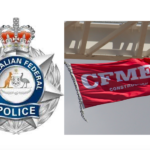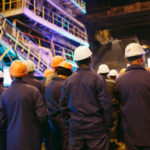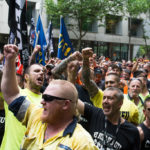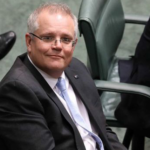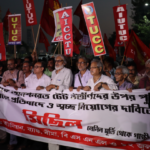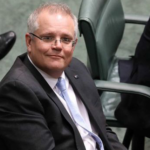Federal Labor Passes Union Busting Laws, Instead of Dealing with Individual Criminals
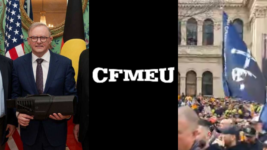
Unions rallied nationwide on Tuesday in response to union-busting legislation that federal Labor, with bipartisan approval, has just passed in regard to the CFMEU, which threaten the working conditions and rights of all union members in the long run if it takes a federal government’s fancy.
These demonstrations swept through major urban centres nationwide. And an ABC announcer corrected herself in describing the disruptions, as she should’ve termed them as “unprotected industrial actions”, meaning workers could be penalised for protesting as it could’ve affected profits.
The basic crux of the matter is Nine conducted a series of investigatory reports into criminality within powerful CFMEU ranks, and as significant crimes or criminals were found to be associated, the federal government has since passed laws allowing it to overtake that union’s administration.
The issue is that instead of having dealt with the individual criminality in the way it might deal with corruption within a major airline, the Albanese government has determined the entire workers’ organisation administration could potentially be corrupt and, therefore, it warrants a takeover.
And these days, both major parties now rely on the appeasement of corporations and their profits over any concerns for the rights of workers.
So, the fact that new laws have just been passed to facilitate this going forward is a windfall for corporates and a threat to future workers’ rights.
A pretext to get stuck in
Building Bad, a series of Nine newspaper articles exposing criminality within the Construction, Forestry and Maritime Employees Union (CFMEU), commenced on 12 July with an article on CFMEU Tasmania-Victoria branch secretary John Setka resigning amid multiple corruption allegations.
And ongoing reports included suggestions of bikies and criminals in powerful positions acting on both federal and state funded worksites. And the articles highlight current bikie figures linked to one of the nation’s most powerful unions, as well as a history of noted bikies having had past affiliations.
But in a 20 August statement, the CFMEU Construction Division condemned the Building Bad series of reports, which included a story on 60 minutes, as being a “stitch up”, which merely presented a set of allegations to the public in a manner that suggested otherwise.
“Corruption was rife in the two big supermarkets, our national airline and big banks, with allegations proven true, however no administrators were brought in,” the CFMEU Construction Division made certain in its press release.
“Yet in a matter of days, with no credible evidence other than sensationalised media headlines, none of which have been afforded due process – a basic right in any democracy – this government is prepared to destroy a union and sack member-elected officials,” the statement underscores.
Union-busting laws enacted
These circumstances may be confusing to casual observers, who ponder how this can be when the government is Labor, which is supposed to be proworker and pro-union, however while this was once true, a gradually emerging new Labor has now fully birthed under PM Anthony Albanese.
And tabled on the 12 August and having since passed both federal houses, the Fair Work (Registered Organisations) Amendment (Administration) Bill 2024 paints a completely different portrait of the laws one might expect the leftist proworker Labor Party to enact.
During his second reading speech, workplace relations minister Murray Watt explained that the Fair Work Commission had applied to the Federal Court on 2 August to have administrators placed on the CFMEU construction divisions in NSW, Tasmanian-Victoria, Queensland-NT and SA branches.
Watt also stipulated that if matters weren’t cleared up by parliament’s resumption that he’d be passing these laws. And he added that they went with administrative takeover and not deregistration, as the latter wouldn’t guarantee a halt to regular union practices, whereas this would.
The minister further suggests that administrative takeover would also “ensure the division acts in the best interests of its members”, which one would assume that is on the proviso that the government appoints proworker administrators and not those concerned with the company first and foremost.
And the bill’s revised explanatory memorandum outlines that it amends the Fair Work (Registered Organisations) Act 2009, so that these laws that govern the operations of registered organisations, like unions, now include those that permit putting parts of the CFMEU under administration.
The laws permit the CFMEU construction and general divisions and their branches to be administered for up to five years, and the bill itself creates a legislative instrument allowing its administration if it’s in the public interest and it’s the Fair Work Commission head who arranges this.
But the workers’ union will have to pay the costs of its imposed administration and administrator, whom will have direct control over other union managerial staff. And the imposed administrator would also be provided with immunity from reprisals, including those from removed persons.
New section 177A of the Fair Work Act 2009 (Cth) explains that a “removed person” is one terminated under the CFMEU reforms either due to suspension or some other means, and they’re then barred from acting as a bargaining representative for any other employee or employer.
These laws stipulate that they do not apply to any other divisions of the CFMEU or any other registered organisation in general. And they further do provide that the administrators take over full responsibility for running an organisation for employee benefit and employees must obey them.
Legislating brilliance
But as the CFMEU has rightly pointed out, when it comes to other types of organisations, say, if someone in a senior managerial role at a bank were found to be in breach of the law, the police would deal with the criminal and the organisation with its own management restructure.
Federal Labor, it would seem, begs to differ when it comes to workers’ organisations, however, as they tend to be concerned with workers’ rights, rather than chiefly with employer profits, and it considers organisations need special outsourced professionals to straighten up employee matters.
And just in case, god forbid, another union is found to have civilians that don’t completely comply with the laws within its ranks, the government has used its forethought and placed these laws on union administrative takeover, within the overriding legislation that covers all workers’ associations.


